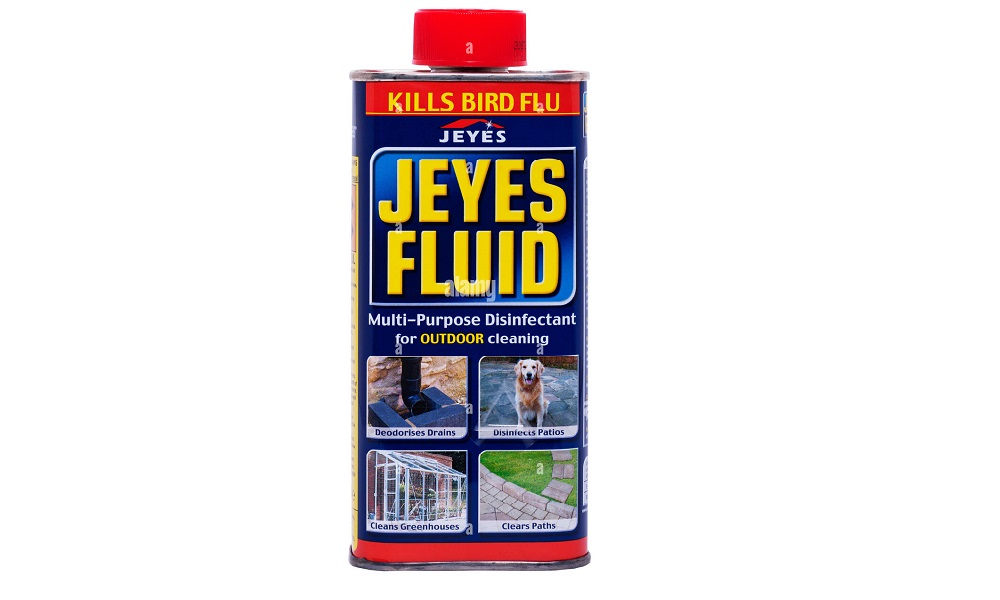Yes, Jeyes Fluid can be harmful to dogs if ingested or if there is prolonged skin contact. It contains chemicals toxic to animals and humans alike.
Jeyes Fluid, a well-known outdoor disinfectant, is used to clean garden areas, patios, and even animal housing. Its potent formula is specifically designed to tackle a wide range of outdoor cleaning tasks, effectively eliminating bacteria and providing a high level of sanitation.
Pet owners must handle this product with extreme care, especially those with dogs, as its ingredients pose a serious risk of poisoning if pets come into contact with the fluid or treated areas before they have dried completely.
Keeping dogs safe around household chemicals, like Jeyes Fluid, requires diligence and knowledge of proper usage to prevent accidental ingestion or exposure.

Understanding Jeyes Fluid And Its Composition
Jeyes Fluid, known for its versatility, is a staple for garden maintenance and outdoor hygiene. It serves as an effective solution for eliminating pathogens, controlling odors, and tackling dirt on a variety of surfaces including paths, patios, and animal housing.
Risks Associated With Jeyes Fluid Exposure To Dogs
Jeyes Fluid poses significant health risks to dogs if ingested or coming into skin contact. Symptoms include vomiting, diarrhea, and chemical burns, emphasizing the need for caution in areas where pets roam. Exposure of dogs to Jeyes Fluid can pose several risks:
Skin Irritation and Burns: Direct contact with Jeyes Fluid can cause skin irritation, burns, and chemical dermatitis in dogs. This can result in redness, irritation, and discomfort.
Ingestion: If a dog ingests Jeyes Fluid, it can lead to gastrointestinal irritation, vomiting, diarrhea, abdominal pain, and oral burns. If ingested in large quantities, it can cause damage to internal organs and potentially be life-threatening.
Respiratory Issues: Inhaling fumes from Jeyes Fluid, especially in concentrated or poorly ventilated areas, can irritate a dog’s respiratory system, leading to coughing, difficulty breathing, or other respiratory problems.
Neurological Symptoms: Severe exposure or ingestion of Jeyes Fluid can result in neurological symptoms such as disorientation, tremors, seizures, or even coma in extreme cases.
Due to the potential risks associated with Jeyes Fluid, it’s crucial to prevent dogs from coming into contact with this substance. If accidental exposure occurs, immediate action is necessary.
Symptoms of Jeyes Fluid Poisoning In Dogs
Jeyes Fluid, a powerful disinfectant, can be toxic to dogs if ingested. Symptoms of poisoning in canines include vomiting, excessive drooling, and abdominal pain, signaling the need for immediate veterinary attention.
Physical Symptoms List
- Vomiting and Diarrhea: These are common signs and can lead to dehydration.
- Respiratory Difficulties: Trouble breathing may occur due to lung irritation.
- Ulcers on the tongue or mouth are indicative of contact with a corrosive agent.
- Seizures can be a particularly severe reaction to toxins in the nervous system.
Behavioral Symptoms List
- Depression or Lethargy: An affected dog might exhibit less energy or enthusiasm.
- Loss of Coordination: This includes stumbling or difficulty walking.
- Excessive Drooling or Pawing at the Mouth: This can denote nausea or oral pain.
- Agitation or Aggressiveness: Uncharacteristic behaviors might present as the dog’s response to discomfort.
Can Jeyes Fluid Make Dogs Sick?
Yes, Jeyes Fluid can make dogs sick if they come into contact with it, ingest it, or inhale its fumes. Jeyes Fluid is a household disinfectant that contains chemicals, including phenols, which can be toxic to animals.
Exposure to Jeyes Fluid may lead to various adverse effects in dogs, including gastrointestinal upset, skin irritation, oral and mucosal irritation, and respiratory distress.
Is Jeyes Fluid Good for Bathing Dogs?
No, Jeyes Fluid is not recommended for bathing dogs. Jeyes Fluid is a household disinfectant and cleaner that contains various chemicals, including phenols, which can be toxic to animals.
Using Jeyes Fluid on your dog’s skin can lead to irritation, dryness, and potential toxicity if the dog licks or ingests the product.
Are Dogs Allergic to Jeyes Fluid?
Yes, dogs can be allergic or sensitive to Jeyes Fluid or its active ingredients, especially phenols and cresols. Allergic reactions in dogs can vary from mild skin irritation to more severe symptoms, depending on the extent of exposure and the individual dog’s sensitivity.
Is Jeyes Fluid Harmful to Cats?
Jeyes fluid is a disinfectant that is commonly used around the home. It can be harmful to cats if they come into contact with it or if they ingest it. The main ingredient in Jeyes fluid is bleach, which can be toxic to cats.
If your cat has come into contact with Jeyes fluid, you should wash them immediately with soap and water. If they have ingested any of the fluid, you should take them to the vet for treatment.
Is Jeyes Fluid Harmful to Plants?
Jeyes fluid is a concentrated disinfectant that is often used for cleaning outdoor areas. It can be harmful to plants if it is not used properly. Jeyes fluid contains chlorine, which can bleach leaves and damage plant roots if it comes into contact with them.
When using Jeyes fluid, be sure to dilute it according to the instructions on the label and avoid spraying it directly on any plants.
Conclusion
Yes, Jeyes Fluid can be harmful to dogs. Jeyes Fluid is a household disinfectant and cleaner that contains various chemicals, including phenols. Phenols can be toxic to animals, and exposure to Jeyes Fluid can lead to a range of adverse effects in dogs.